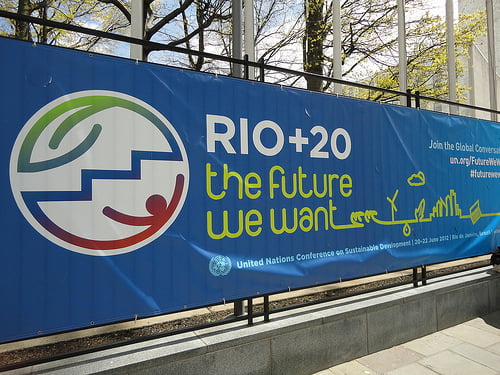

Features
Reflections on Rio: was it really that bad?
Mike Scott writes about how the UN Conference on Sustainable Development, or Rio+20, perhaps wasn’t all as bad people have made out.
“We recognise that the planet Earth and its ecosystems are our home and that Mother Earth is a common expression in a number of countries and regions and we note that some countries recognise the rights of nature in the context of the promotion of sustainable development. We are convinced that in order to achieve a just balance among the economic, social and environment needs of present and future generations, it is necessary to promote harmony with nature.” Article 39, The Future We Want, Rio+20 Outcome Document.
The above extract from the text of the summit held to celebrate the 20th anniversary of the first Earth Summit in 1992, an event involving thousands of delegates and more than 100 world leaders, provides stark evidence of just how broken the global multilateral institutions are.
Brazil was so fearful of a repeat of the Copenhagen climate conference in 2009 – when negotiations dragged on through the night and yet still failed to produce a conclusive agreement – that it simply deleted anything in the text that was remotely contentious, leaving a document that was full of meaningless waffle like the paragraph above, and agreed before most world leaders had even arrived in Rio.
It has been widely noted that while the word “encourage” appears in the document 50 times, but the phrase “we will” only five times; “support” is used 99 times, “must” just three.
The Future We Want would appear to be barely worth the paper it’s written on and reaction has been scathing – the UN Group of Major NGOs, for example, said: “You cannot have a document called The Future We Want without any mention of planetary boundaries, tipping points or planetary carrying capacity. The text as it stands is completely out of touch with reality. Just to be clear, NGOs at Rio do not endorse this document.”
And yet maybe this isn’t, despite appearances, the worst outcome to a major summit in recent times. Perhaps the negotiators have unconsciously produced a document that subconsciously subscribes to Google’s “Do no harm” mantra.
Given the severe disagreements that re-emerged between developed and developing countries over what the green economy is and who should pay for it, policymakers appear to have left the field clear for other players to take up the baton, but at least they haven’t destroyed the field.
And there were some really encouraging signs that the business and investment communities are stepping up to the challenge.
Among the initiatives that emerged on the sidelines of the summit was an announcement that the world’s biggest development banks will put a staggering $175 billion towards sustainable transport in developing countries.
There was also an agreement by more than 30 governments and institutions to harness the purchasing power of national and local governments, which makes up between 15% and 25% of GDP, in the cause of sustainable procurement. The signatories ranged from emerging giants Brazil and China to bastions of the industrialised world such as Denmark, Switzerland and the Netherlands.
This was just one example of how governments that could not agree in the main event were happy to sign up to specific initiatives outside of the Rio+20 framework, suggesting that governments are growing weary of the multilateral process, too.
Even the US government, which is trapped into inaction by its domestic politics, has agreed to host a dialogue with the Consumer Goods Forum, whose 400 members have pledged to achieve “zero net deforestation” in their supply chains by 2020.
The corporate world signed up to a range of other radical changes too – 16 companies in the food and agriculture sector committed to develop principles on sustainable agriculture; 45 corporate giants including Coca-Cola, Dow Chemical, Royal Dutch Shell and Tata Steel highlighted the importance of global water sustainability; and more than 70 businesses, governments and international organisations signed up to the Green Industry Platform, an initiative to mainstream environmental and social considerations into corporate operations through efficient use of energy and raw materials, innovative practices and applications of new green technologies.
The investment community got in on the act, too, with five stock exchanges including Nasdaq, Brazil’s Bovespa and the Johannesburg Stock Exchange agreeing to incorporate sustainability criteria into their listings requirements.
The insurance industry also unveiled a new set of Principles for Sustainable Insurance, a companion to the Principles for Responsible Investment.
Meanwhile, the UK announced all companies listed on the London Stock Exchange would have to report their carbon emissions, while – in a good example of how the outcome document can be seen as a useful springboard rather than a limit on ambitions – a group of governments (Brazil, Denmark, France and South Africa) joined investors and companies to commit to corporate sustainability reporting, expanding on Article 47 in the outcome document.
There were individual business pledges too, perhaps the most notable being Bank of America’s announcement of $50 billion of investment in energy efficiency, energy access and renewable energy over the next 10 years and Unilever’s plan to cut greenhouse gases associated with its products in half by 2020. In total, more than $500 billion was pledged in fields including energy, transport, green economy, disaster reduction, desertification, water, forests and agriculture.
It is easy to be cynical about pledges made at summits – but unlike politicians, business knows that it cannot afford not to follow through on its commitments. Another factor to remember is that companies are not adopting sustainability issues because it is the right thing to do but because an increasing number of them are convinced that it is the best way to manage risks and discover opportunities for their businesses.
Business still wants governments to provide clarity, a long-term perspective and a clear sense of direction, but it is no longer prepared to wait for this – instead, it is grasping the bull by the horns and pressing ahead with sustainability reforms.
At the 2007 climate conference in Bali, the delegate from Papua New Guinea famously told the US delegation, which was blocking every substantial measure: “We seek your leadership. But if for some reason you are not willing to lead, leave it to the rest of us. Please get out of the way.”
Now it seems the business community has issued this message to all governments – the results will be interesting to see.
Mike Scott is a freelance writer specialising in environment and business issues for the press and corporate clients. His work has been published in the Financial Times, The Times, the Guardian and the Daily Telegraph as well as in business publications ranging from Bloomberg New Energy Finance to Flight International.
Further reading:


 Environment10 months ago
Environment10 months agoAre Polymer Banknotes: an Eco-Friendly Trend or a Groundswell?

 Environment11 months ago
Environment11 months agoEco-Friendly Home Improvements: Top 7 Upgrades for 2025

 Features9 months ago
Features9 months agoEco-Friendly Cryptocurrencies: Sustainable Investment Choices

 Features10 months ago
Features10 months agoEco-Friendly Crypto Traders Must Find the Right Exchange





























